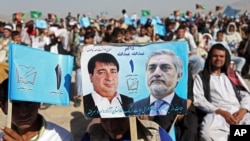On the eve of Afghanistan’s runoff election, both presidential hopefuls have tried to reassure neighboring Pakistan they want to improve bilateral ties through enhanced political and economic cooperation. Islamabad has also vowed to strictly adhere to a policy of non-interference, but observers see daunting challenges facing the two nations as they seek to overcome years of mutual suspicion and mistrust.
Border security
Pakistani authorities say they have taken special steps to beef up security along what is considered a mostly porous border to help their Afghan counterparts protect the runoff presidential election. Foreign Ministry spokeswoman Tasneem Aslam reiterated her country’s resolve to support a peaceful democratic transition in Afghanistan.
“It is our earnest hope that the Afghan nation would emerge stronger and more unified at the culmination of these elections,” she stated.
Pakistan’s alleged links to the Afghan Taliban insurgency have long hindered efforts to improve bilateral ties.
Outgoing Afghan President Hamid Karzai’s administration accuses Pakistan's military spy agency, the ISI, of trying to disrupt the presidential election. His National Security Council last week went further, alleging that a Pakistan-based Islamist group, with perceived links to the ISI, plotted the recent assassination attempt on front-runner presidential candidate Abdullah Abdullah that left more than a dozen people dead.
However, speaking via Skype at an event hosted by the Washington-based Atlantic Council and Center for American Progress Thursday, Abdullah took a conciliatory tone, saying if elected he would want to have “good neighborly” relations with Pakistan and seek its cooperation in dealing with the threat of terrorism.
“Today, one harsh reality is that both countries are faced with the same challenge (of terrorism) and it is in the interest of both countries to deal with it with a genuine spirit of good neighborly relations. So, we are very much looking forward to a better future for our people rather than living in the perceptions of the past,” said Abdullah.
The U.S. think tank earlier this month invited Abdullah’s presidential rival, Ashraf Ghani, to discuss his vision of Afghanistan’s future relations with Pakistan. He said Pakistan has recently seen a rise in terrorist acts on its soil and appears ready to join hands with Afghanistan to tackle the problem and enhance economic ties.
“We need to envisage a 10-year process, at the end of which these two countries become pillars of regional stability… This is a fundamental axiom, on the basis of which I'm going to proceed,” stated Ghani.
Harboring militants
Pakistan has long been accused of sheltering al-Qaida affiliates and Taliban militants in its border region and facilitating insurgent attacks across the Afghan border. However, in recent years Islamabad has been complaining that Kabul is allowing fugitive leaders of the Pakistani Taliban to use the Afghan soil for launching deadly cross-border raids on Pakistani military outposts.
Pakistani Senator Afrasiab Khattak hopes the future Afghan leadership will not “turn a blind eye” to the Pakistani fugitives on their soil, warning increasing terrorism and extremism are problems for both nations.
“I think both the states need to address this question and I think this can be the biggest confidence building measure between the two countries. If the (two) states evict militants and take over borders if the states run the borders by themselves I think it is going to stop this blame game,” said Khattak.
Islamabad has this month twice summoned the Afghan ambassador to Pakistan to formally protest several raids carried out by fugitive Pakistani militants in which Pakistani soldiers guarding the frontier were killed.
Afghan Elections Candidates
Abdullah Abdullah- Received 45 percent of vote in first round of presidential election
- Served as Hamid Karzai's foreign minister
- Ran for president in 2009
- Was an eye doctor
- Father is Pashtun, mother is Tajik
Ashraf Ghani
- Received 32 percent of vote in first round of presidential election
- Served as Hamid Karzai's finance minister
- Ran for president in 2009
- Former World Bank official and professor at Johns Hopkins University
- Pashtun
Presidential front-runner Abdullah said while he could not confirm the reported presence in northeastern Afghanistan of Pakistani militant leaders, he is strongly opposed any terrorist activity on Afghan soil. “I am absolutely against the presence of terrorists here. If those terrorists are there then it will be for the Afghan state to action against them,” he said.
Officials in Pakistan insist that Afghanistan’s reluctance to accept the long border dividing the two countries as an international frontier is also hindering counter-terrorism efforts.
Mohammad Sadiq Khan is Islamabad's former ambassador in Kabul, and is now the secretary of National Security Division and part of key deliberations regarding Pakistan's counter-terrorism strategy. He said that around 56,000 Afghans visit Pakistan every day, and both countries need to jointly monitor this movement to prevent illegal crossings.
“When we do not do that and we keep the border porous and unregulated, essentially we criminalize the border. Most of the criticism against Pakistan inside Afghanistan as well as internationally is because of this border, which is sort of free for all. So, the criminalization of Pakistan-Afghanistan border it needs to be reversed,” Khan said.
It is widely believed that the Taliban took control of most of Afghanistan in the late 1990s with the help of the Pakistani spy agency and that it is still allegedly sheltering Taliban leaders. Pakistani officials reject the allegations and insist they do not support any single faction in Afghanistan and have developed links with all political forces in the country to promote regional peace and stability.




